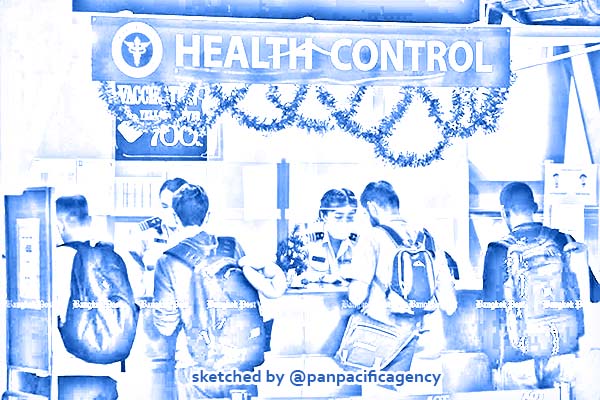Thai govt closes more public facilities, extended existing restrictions until Apr 30

Health control on a border. Photo: Bangkok Post. Sketched by the Pan Pacific Agency.
BANGKOK, Mar 27, 2020, Reuters. The Thai government on Friday (March 27) ordered the closing down of more public facilities and businesses in a bid to curb the spread of coronavirus, and extended existing closures until the end of April, The Straits Times reported.
Thailand reported 91 new coronavirus cases and one fatality on Friday, bringing the total to 1,136 cases and five deaths, a health official said on Friday. So far, 97 patients have recovered and gone home.
The latest death is of a 50-year-old man in Narathiwat province, bordering Malaysia, who apparently contracted the disease from attending a religious gathering at a mosque in Kuala Lumpur last month, a Thai health official said.
The death has led to the lockdown of the southern province by its governor, preventing traffic in and out except for ambulances, trucks carrying essential supplies and official vehicles.
The government’s new Centre for Covid-19 Situation Administration (CCSA) in Bangkok says provincial governors now have the authority to implement strict regulations to contain the outbreak.
“Now is not a normal situation, but its an emergency and people’s movements may be difficult, so everyone should stay home,” said Mr Taweesin Wisanuyothin, a spokesman for CCSA.
The authorities in Bangkok, the city with most of the coronavirus cases, have ordered the further shutdown until April 30 of facilities including libraries, museums, playgrounds, sporting grounds, meeting halls, childcare centres and beauty clinics.
The government has also extend the closure of shopping malls, eat-in restaurants and other businesses that were shut down earlier this week to April 30 as well.
Essential businesses such as supermarkets, grocery stores and pharmacies will remain open in Bangkok, while the government has reopened phone shops, food courts in hospitals and flower shops in markets in the capital.
Several provinces have also issued orders to restrict the opening and closing times of 24-hour convenience stores to reduce the time when people are out in public places.